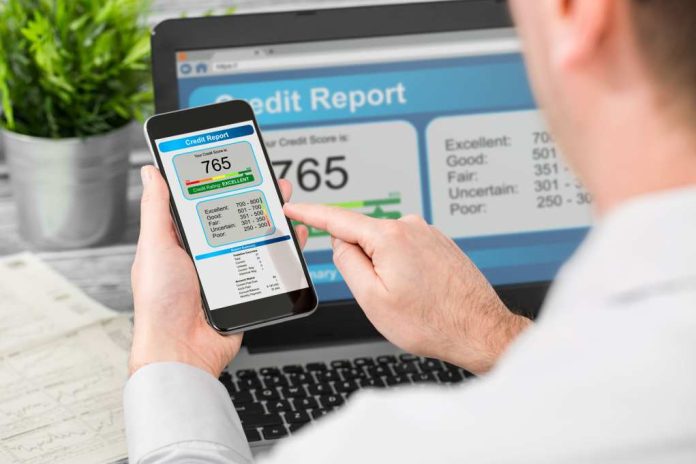
Your credit is something that you should always keep in mind as you deal with your finances. That’s because it is so important when it comes to helping you reach your goals like getting a house, buying a car, etc. There are plenty of ways that you can properly manage your credit score. Sadly, not a lot of people have that information. That is why we hope to provide you with some useful knowledge that can help! One key part of managing your credit score is to monitor your score. Credit monitoring is important when it comes to your credit because it allows you to keep up with roughly how well your score is doing. However, there’s a common misconception that you can’t check your credit score safely. Luckily, that’s just a myth! We will go over the basics of your credit score, and how to safely check your credit score.
The Basics of Credit Scores
Your credit score is a number that’s usually between 300 to 850. This score is important because lenders use it in order to better understand your creditworthiness. Creditworthiness refers to how you handle the credit that you borrow. This score is calculated by credit bureaus (also known as credit reporting agencies) that use information found on your credit report. Your credit report is exactly what it sounds like! It is a report of your credit accounts and includes information like your payment history, credit balances, and more.
There are three major credit bureaus which are Experian, Equifax, and Transunion. When calculating your credit score, credit reporting agencies will use scoring models in order to determine how each item on your credit report impacts your score. There are two main scoring models. There is the VantageScore model and the FICO scoring model. However, the one that is more popular is the FICO scoring model because it is used by 90% of top lenders. The scoring model that’s used can vary by credit bureau.
What Factors Affect Your Score?
Now that you know the basics, it’s time to learn about it more in-depth! For reference on the factors below, we will be using the FICO scoring model since it is the one that is most used. There are five factors that can affect your score which are:
- Payment History
- Credit Usage
- Age of Credit History
- Hard Inquiries
- Mix of Credit
Payment History
This is the most important factor when it comes to your credit score. That shouldn’t be a surprise though because it can easily show lenders how you repay your debts. This factor accounts for 35% of your credit score. It would include information like your on time payments, late payments, etc.
Credit Usage
Your credit usage also known as your credit utilization ratio accounts for 30% of your score. Credit utilization refers to the ratio that compares your current credit usage to your overall credit limit. Let’s look at an example for context! If your overall credit limit is $2,300 but you are using $1,104 then your current credit utilization ratio is 48%.
Age of Credit History
The third factor on this list is the age of your credit history. That would include information like the age of your newest account, the age of your oldest account, the average age of all your credit accounts, and more. This factor impacts 15% of your credit score.
Hard Inquiries
When you need to qualify with lenders, you will need to deal with hard inquiries. Hard inquiries are also known as hard pulls. These provide lenders the access they need in order to get an in-depth look at your credit file. However, hard inquiries require the borrowers written permission in order to gain this access. Hard inquiries are not like soft inquiries because soft inquiries do not impact your credit score. This factor accounts for 10% of your credit score.
Mix of Credit
There are two main types of credit accounts. There are installment loans and revolving credit. Having a variety of different credit accounts can show lenders that you know how to handle different types of credit. This factor impacts 10% of your credit score.
What are the Different Score Categories?
Depending on the scoring model, credit scores will fall into different categories. Since the FICO scoring model is most popular, we will start from there. For the FICO model:
- Poor (credit scores that are between 300 and 579)
- Fair (credit scores that are between 580 and 669)
- Good (credit scores that are between 670 and 739)
- Very Good (credit scores that are between 740 and 799)
- Exceptional (credit scores that are between 800 and 850)
On the other hand, the VantageScore model is a little different. According to the VantageScore model:
- Very Poor (credit scores that are between 300 and 499)
- Poor (credit scores that are between 500 and 600)
- Fair (credit scores that are between 601 and 660)
- Good (credit scores that are between 661 and 780)
- Excellent (credit scores that are between 781 and 850)
It’s also important to keep in mind that there are different versions of each scoring model. For example, as of 2021 there were 16 versions of the FICO scoring model! Different scoring models can mean different credit scores.
Why is Your Credit Score Important?
We talked about how lenders use your score to determine your creditworthiness. However, we should take a look at why that even matters. Most people don’t have the money upfront they need in order to afford the purchases they want and need like a car or a house. That is where lenders come in. Lenders are companies like financial institutions that can help people finance their purchase. They can also determine if a person qualifies for certain opportunities like a credit card. Your credit score helps lenders understand the risk they face if they provide you credit like financing through loans, a credit card, etc.
How to Safely Check Credit Score Standing?
If you want to safely check your credit score standing there are plenty of ways to do that. There’s a common misconception that checking your credit score can lower it. People think that they face a credit risk if they check on their score. That’s because when lenders check your credit score (with a hard inquiry) there is a negative impact on your score. In fact, your score can decrease by up to 5 points. On the other hand, when you check your own credit score, it is a soft inquiry. That means that there will be no impact on your credit score. You can check your score by:
- Checking with your credit card companies
- Using a third party app
- Using a free credit scoring website
Checking with Your Credit Card Companies
One of the easiest ways that people can check their credit score is by checking with their credit card company. For example, if you have a Discover credit card, then you can use their online customer portal to check your FICO score for free. Each credit card company has their own way that customers can review their score. If you are interested, you should check with yours to see what may be available!
Using a Third Party App
Another way that you can check your credit score for free is by using a third party app. There are apps available that can help people when it comes to their credit score like Credit Karma, Experian, Mint, and more. These apps allow consumers to check out their score from the convenience of their phone at any point! They can also provide other services but this varies by app.
Using a Free Credit Scoring Website
There are so many easy ways that you can check your credit score. Besides the options listed above, you can also use a free online website. Some reputable websites are made by the same people that offer apps. This includes Credit Karma! However, some other free sites include Credit Sesame, Credit.com, WalletHub, and more.
Can Checking Your Score Damage It?
Possibly! It depends on what you mean. If a lender needs to check your credit score with a hard inquiry, then you can expect your credit score to go down. That’s because that type of credit check is a hard inquiry. On the other hand, if you check your score on your own, then that involves a soft inquiry and will not impact your score.
Frequently Asked Questions
There are plenty of questions that can come up when you are learning about your credit score, and how to check it. Other people have had questions as well that may be able to give you a little more information.
What Kind of Information is Found on Your Credit Report?
You can expect your credit report to contain information like your payment history, credit card balances, and more. This information is what credit bureaus use to determine your credit score.
Will a Credit Check Be on Your Credit Report?
It depends! If you get a hard inquiry then you can expect it to be on your credit report. On the other hand, if you check your credit score by yourself then there will be no negative impact on your credit report or on your score.
How to Get a Free Credit Report?
Consumers are able to get a free credit report once a year by visiting AnnualCreditReport.com. You can only get one free credit report every year. That means any more than that can result in a small fee that you may have to deal with. Getting a free credit report can help you make sure that the information on your credit report is accurate.
What are the Three Major Credit Bureaus?
The three major credit bureaus are Experian, Equifax, and Transunion. While there are other credit bureaus, these are the ones that are most important.
What is a Free Credit Score?
Sometimes you may see advertisements for a free credit score. However, that just means that you can check your credit score for free. But if a company is offering to give you a free new credit score then you are likely dealing with a scam.
Why Should You Get a Free Copy of Your Credit Report?
You will want to get a free copy of your credit report to review it for any errors. You may find that there is an issue on your credit report. This may be an account that doesn’t belong to you, an incorrect payment posted, etc. There are a variety of different errors that you can encounter on your credit report.
If you come across an error on your credit report then you have the right to dispute the item with the credit bureaus. Due to the Fair Credit Reporting Act (FCRA), credit bureaus must have accurate information on a consumer’s credit report. If the item is inaccurate it will be removed from your credit report which means there will be no negative impact on your score anymore!
What are Credit Monitoring Sites?
While you can review your credit report by getting a free copy of your credit report every year, there are other ways you can monitor your credit. There are credit monitoring sites that alert people when new items are added onto their credit report. This can help you be mindful of both your credit score and the information on your credit report that impacts your score!
Bottom Line
Overall, your credit score is something that is an important part of life. Your credit score is a number that’s usually between 300 and 850. This score is important because lenders use it in order to better understand your creditworthiness. Creditworthiness refers to how you handle the credit that you borrow. Your credit score helps lenders understand the risk they face if they provide you credit like financing through loans, a credit card, etc.
There’s a common misconception that checking your credit score can cause it to lower. People think that they face a credit risk if they check their score. That’s because when lenders check your credit score (with a hard inquiry) there is a negative impact on your score. In fact, your score can decrease by up to 5 points. On the other hand, when you check your score yourself it is a soft inquiry. That means that there will be no impact on your credit score! There are plenty of safe ways to check your score for free. There are also credit monitoring services that some apps provide for a fee. Regardless, make sure to review your options so you are on top of what’s going on with your credit.
Article References
https://www.investopedia.com/terms/c/credit-worthiness.asp
https://www.debt.org/credit/report/scoring-models/
https://www.ficoscore.com/about
https://www.creditkarma.com/advice/i/what-affects-your-credit-scores
https://www.experian.com/blogs/ask-experian/fico-score-versions/
https://www.experian.com/blogs/ask-experian/how-many-points-does-an-inquiry-drop-your-credit-score/
https://www.annualcreditreport.com/index.action
















